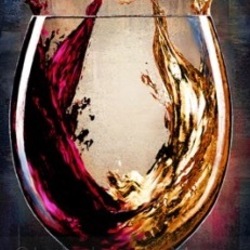Château Taillan Lagrave
Lagrave Martillac
Grand Vin de Graves Pessac-Léognan 2016
At a 58th birthday. — 6 years ago
Lagrave Martillac
Pessac-Léognan Red Bordeaux Blend 2014
Toasty, but integrated, softens with air. Roses meet dark forest berries, blackcurrant, mocha, and tobacco. Fresh, juicy with balanced tannin and linear acidity. Touch of heat but the finish builds. Opened with time in the glass. Will age 5+ years. Second label. — 8 years ago
Château Feytit-Lagrave
Pomerol Red Bordeaux Blend 2019
Excellent. Smooth. Blackcurrant velvet. Tannins not heavy. — 10 months ago
Château Cos d'Estournel
Saint-Estèphe Red Bordeaux Blend 1991
Is there any meal better than steak (Ribeye) and well aged Claret? This is another 1991 Bordeaux experiment of mine. 1991 was a vintage with horrible frosts and a less than favorable growing season, right? A vintage critically panned. This is my 3rd recent 91 from a good producer. And again, it didn’t disappoint. Like 97 and 07, it’s better with the right bottle age than young. Magic evolution happened in the bottle way down the road. This 91 is in great form with a fair amount of life ahead of it. On the nose; a little ripe fruit funk, wonderful dark & lighter red cassis, ripe blackberries, dark cherries, poached strawberries, plums, hues of blueberries, black raspberries, dry cranberries, vanilla, light cinnamon, rich, black turned earth, cedar, soft leather, dry stones, dry top soil, notes of dry herbs and fresh & dry red flowers. The body/palate is medium, round, ripe & still fresh. The tannins nearly completely resolved. Ripe, floral fruits of; blackberries, dark cherries, poached strawberries, plums, hues of blueberries, black raspberries, dry cranberries & half cooked rhubarb. Vanilla, light cinnamon, touch of clove & nutmeg, rich, black turned earth, cedar, soft leather, dry stones, dry crushed rocks, dry top soil, notes of dry herbs, a little band-aid and fresh & dry red flowers. The acidity drips over the palate and the long, well balanced, still structured, nice tension, good length finish lasts over a minute. Again, love & appreciate the 12.5% alcohol. What a beauty with and without the steak. Next time you’re in your fine wine retail shop and see a quality producers 91 that’s been well stored, buy it and have it with a Ribeye. Photos of; their exotic Estate, Chateau interior, newer barrel room and their vines as viewed from the front of the Chateau that are across the road. Producer notes and history...Cos d’Estournel has a long distinguished history in the St. Estephe. Louis Gaspard d’Estournel, gave his name to the estate after founding in 1811. It did not take long before Cos d’Estournel became famous with wine lovers and royalty all over the world. In those early days, Cos d’Estournel did not sell through Negociants. The owner preferred selling his wine directly to his customers. In fact, Cos d’Estournel was exported to numerous countries across the globe, with a large portion of the production being sold to India. It was that connection to India that inspired much of the unique, east Indian design we see at Cos d’Estournel today. Cos d’Estournel was one of the first Bordeaux Chateaux’s to bottle, label and sell their own wine. This practice continued until the death of Louis Gaspard d’Estournel in 1852. If you’re at the property, the statue on the bench in the front courtyard is of the founder, Louis Gaspard d’Estournel. The Estate was then purchased by an owner that sold their wines on the Place de Bordeaux using the negociant system. If the Chateau was not selling their wines through the negociant system, it would never have been included in the 1855 Classification. Imagine that! So, it turned out to be a fortuitous decision. Cos d’Estournel was sold to the Charmolue family owners of the neighboring Estate of Chateau Montrose. They continued to own the estate until 1917, when it was bought by Fernand Ginestet. This purchase was the beginning of the next major step in the development of Cos d’Estournel. Decades later, the grandchildren of Fernand Ginestet, Jean-Marie Prats, Yves Prats and Bruno Prats took over ownership and management of Cos d’Estournel. In 1995, Bruno Prats sold the property to the Merlaut family, owners of the Taillan Group. The next era in the development of Cos d’Estournel took place in 2000, when Cos d’Estournel was bought by the industrious and wealthy Michel Reybier, who earned his fortune in the food industry. Michel Reybier hired the son of Bruno Prats, Jean-Guillaume Prats to manage Cos d’Estournel. Things further improved with the efforts of Jean-Guillaume Prats who helped design the most modern wine making at that time. A complete renovation of Cos d’Estournel took place in not only the wine making facilities and cellars, but in parts of the Chateau as well. While the wine making facilities are completely modern with their 100% gravity design, the outward appearance retained the original design and feeling that has always been a part of Cos d’Estournel. On October 15, 2012, Jean Guillaume Prats announced he was leaving Cos d’Estournel to join LVMH (Pichon Baron). Jean Guillaume Prats was replaced by Aymeric de Gironde. Following the departure of Aymeric de Gironde in 2017, the owner, Michel Reybier took over managing the Estate. What makes the remodel special is that the cellars of Cos d’Estournel are entirely operated by gravity. There are no pumps of any kind to force the wine. The purpose is to allow a gentleness to the wine and improve its purity and allow for the expression of their terroir. It set a new benchmark for cellars not only in the Left Bank, but in all of Bordeaux. Perhaps, the most inventive part of the cellars is the four 100 hectoliter lift tanks or wine elevators that replace the pumps used in the traditional pumping over and the racking off processes, which introduce air and often destabilize the marc. From the moment the grapes arrive, everything travels by the flow of gravity. Jean Guillaume Prats called this process a “pumpless pump over.” The 91 hectare vineyard of Cos d’Estournel is planted to 65% Cabernet Sauvignon, 33% Merlot, 1% Cabernet Franc and 1% Petit Verdot. The vineyard is located extremely close to the border between Pauillac and Saint Estephe at the southern tip of the Saint Estephe. The Estate has very old Merlot vines as well, which date back more than 100 years. Part of the terroir is situated on the hill of Cos, which is at a high elevation for the Medoc at 20 meters. They also make a second wine called Pagodes de Cos. This is a great wine to buy in very good vintages. Especially, if your budget prohibits you from purchasing their first wine. — 8 years ago

Château du Taillan
Cru Bourgeois Haut-Médoc Merlot Blend
Super bon. Peut encore traverser les autres années — 10 months ago
Château Lagrave Paran
Cuvée Géraldine Bordeaux Supérieur 2019
Very very good. Red fruit. Chocolate. Chalk. Well balanced. — 3 years ago
Tröegs Brewing Company
Tröegs LaGrave Tripel Golden Ale
Mild Fruity undertones. Yeasty finish — 7 years ago
Bernard Taillan
Montagne-St. Émilion Merlot Blend 2015
Dry, well balanced with a very good nose. Would buy this if I knew where. It was a gift from a friend living in the Bordeaux area. — 8 years ago




JKT
Balance and soft textures thirty years! Say ten years after acquiring from JR whose email says matriarch passing freed up this library holding back then. — 23 days ago